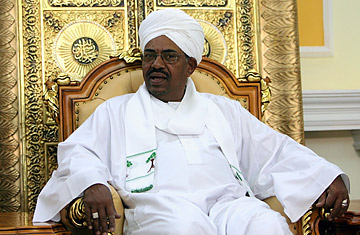
Sudanese President Omar al-Bashir
Sudan's elections, originally designed to help keep the country together, have likely ensured the opposite. President Omar Hassan al-Bashir, the first sitting head of state to be indicted by the International Criminal Court at The Hague, has been declared the victor in what was billed as the nation's first multiparty polls in 24 years. The election, however, has been tainted with opposition boycotts and allegations of rigging. The final result announced Monday — an extended reign in power for Bashir — came as a surprise to no one, but heralds what could likely be the final chapter for Africa's largest nation before it fully fragments into two — or three, or four.
Sudan has been racked by crises ever since its independence in 1956, but none — not even the conflict in Darfur, where some 300,000 died and from where Bashir's war crimes charges stem — rivals the one now facing north and south Sudan in the next year. Already, the country acts as a quasi de facto two-nation state, housing two presidencies, two distinct armies, and even two different visa entry passes. But in January, southern Sudan will vote on whether to make the divorce official, choosing in a referendum whether it will choose to separate and declare full political independence. Southerners are expected to overwhelmingly choose separation, and the "rigged" elections have offered them no reason to change their mind. In what is a particularly strong southern verdict on Bashir's regime, southerners voted by huge margins for the Sudanese leader's main challenger, Yasir Arman, despite his official withdrawal from the vote.
The northern government in Khartoum has no wish to lose sovereignty over the oil-rich south. And Bashir, the world has been reminded, does not like losing. Each step of the year-long electoral process seemed manipulated to give an edge to his ruling National Congress Party. The national census, used to determine the regional distribution of population and parliamentary seats, severely undercounted populations hostile to the regime and inflated numbers in Bashir strongholds. Gaping holes now blot the constituency map in Darfur, where thousands of displaced didn't register to vote. During the campaign, state security agents ensured free campaigning was kept to a minimum, while the state media eschewed balanced coverage. The polls themselves were shoddily organized: some voters struggled for days to find their names on electoral lists. That Bashir was blessed with a particularly divided and rudderless opposition, easily infiltrated and bought-off, also did not hurt. To top it all, Bashir's two biggest challengers, Arman included, pulled out of the race days before polling. In its preliminary assessment, elections monitors The Carter Center (of former U.S. President Jimmy Carter) declared: "It is apparent that the elections will fall short of meeting international standards."
Manipulating elections is one thing. Denying the south independence is quite another. Sudan's elections were postponed twice and there is even less time to organize for the January referendum. But war looms for anyone tempted to deny the Sudan People's Liberation Movement, the south's dominant political force, their vote on secession, as promised in Sudan's landmark 2005 north-south peace deal. "I think you saw a lot of give and take around the elections, and I think the prospects for that are far slimmer when it comes to the referendum," says Zach Vertin, analyst for the Brussels-based think-tank International Crisis Group. "If there are attempts to delay or obstruct the exercise of the referendum, then I think you have a much firmer response from the SPLM, and I think the chances for a renewed conflict increase pretty quickly."
How quickly? If denied its referendum on time, Southerners have already threatened to declare independence unilaterally. War could follow. And it would likely be bloody: some two million people died during the last two southern rebellions. Nor would war likely be confined to the south. Besides Darfur, discontent in the country's east is growing, where a 2006 peace agreement to end the area's most recent rebellion has gone largely unimplemented. Discontent also looms in two northern states which sided with the SPLM during the war — Blue Nile and Southern Kordofan — that are expected to be left on the northern side of the border post-independence. "While the south has a right to and will likely opt out of Sudan's problems, these elections have underscored that Sudan's problem — a concentration of power and wealth by this party in the center at expense of the peripheries — will remain," says Vertin. Bashir may have won the presidency of Sudan. But in the years to come, it is likely to become increasingly unclear what that means.
